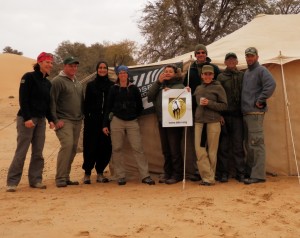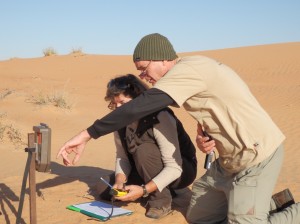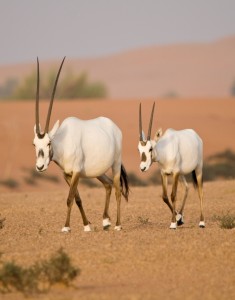 Dubai Desert Conservation Reserve (DDCR), the first and largest protected wildlife conservation area in the UAE, has announced the start of a new long-term research expedition programme in partnership with Biosphere Expeditions. The first expedition under the programme took place from the 15th to the 23rd of January 2012.
Dubai Desert Conservation Reserve (DDCR), the first and largest protected wildlife conservation area in the UAE, has announced the start of a new long-term research expedition programme in partnership with Biosphere Expeditions. The first expedition under the programme took place from the 15th to the 23rd of January 2012.
The programme is a unique experience where DDCR and Biosphere Expeditions assemble a team of paying volunteers, on an annual basis, to do research and survey work within the DDCR and collect data on three wildlife species found in the reserve, namely Arabian Oryx, Macqueen’s Bustard and Gordon’s Wildcat. Biosphere Expeditions is an international non-profit organisation that supports wildlife and desert conservation through activities such as organising volunteer research expeditions.
“DDCR’s primary objective is to conserve and protect the natural fauna and flora of Dubai’s inland desert environment. This unique expedition programme is the first of its kind in the UAE, and will assist us tremendously in the work that we do. It has been designed to enhance and complement our current efforts, particularly on the research that we’re doing on three rare species – Arabian Oryx, Gordon’s Wildcat and Macqueen’s Bustard,” said Gregory Simkins, Conservation Manager, DDCR.
“Our collaboration with Biosphere Expeditions also allows us to further diversify the type of sustainable tourism activities that we can offer within the protected area, under carefully regulated or controlled conditions.
 Programmes such as this one allow visitors to the reserve to not only contribute financially to the desert conservation work, but also become actively involved in the conservation work itself,” concluded Simkins.
Programmes such as this one allow visitors to the reserve to not only contribute financially to the desert conservation work, but also become actively involved in the conservation work itself,” concluded Simkins.
Under the programme, Biosphere Expeditions will assemble the volunteer groups and run the expeditions in collaboration with DDCR staff. A Biosphere Expeditions scientist will also assist the DDCR in writing up the results of the expedition, and where appropriate – will jointly publish research papers.
“We are delighted to have found an excellent partner in the DDCR to contribute to an important desert conservation project in the Middle East,” said Dr. Matthias Hammer, founder and executive director of Biosphere Expeditions.
For the first expedition that was recently completed, there were seven volunteers who came from various countries including the US, Germany, Austria, Australia and the UAE. “I found the expedition very informative and interesting. I had a great time and I learnt so many new things about the Dubai desert and its animals,” said Evelyn Brey, the participant from the UAE.
Next year – two expeditions are scheduled in the UAE and will take place on 12-19 Jan 2013 and 20-27 Jan 2013.
The Expedition Programme
 The eight-day programme can accept a maximum 12 volunteers. No special skills are required to be able to volunteer and all field training will be given during the expedition – such as identifying the species that will be surveyed, identifying tracks as well as taking field notes and recording animal behaviour. An expedition leader from Biosphere Expeditions, as well as local scientists from DDCR will prepare the volunteers for their field tasks, explain the research methods and goals as well as familiarise them with safety, the equipment used and the area in which the expedition will take place.
The eight-day programme can accept a maximum 12 volunteers. No special skills are required to be able to volunteer and all field training will be given during the expedition – such as identifying the species that will be surveyed, identifying tracks as well as taking field notes and recording animal behaviour. An expedition leader from Biosphere Expeditions, as well as local scientists from DDCR will prepare the volunteers for their field tasks, explain the research methods and goals as well as familiarise them with safety, the equipment used and the area in which the expedition will take place.
Operating from a field base of a Bedu-style tent camp, the expedition team are divided into small groups and each group is assigned specific activities. These activities will be rotated amongst teams so that everyone can take part in all of them.
Activities include:
· Surveying Gordon’s wildcat – participants will set up the bait and cage, record a captured cat’s size and markings, take blood and tissue samples for DNA analysis and fit the cat with a GPS collar before releasing it back into the wild;
· Monitoring Arabian Oryx – volunteers will locate and follow a herd of Oryx by vehicle and on foot and record data on herd movements, structure (male/female ratios, number of calves, identifying dominant individuals among the herd), take photos to assess body condition and record both habitat and diet preference by identifying plants grazed;
· Macqueen’s Bustard monitoring – participants will track and locate individual bustards using radio telemetry equipment and record data such as preferred habitat, diet, interactions and breeding behaviour;
· Biodiversity surveys – whenever in the field, volunteers will also assist in DDCR’s ongoing biodiversity survey by recording fauna and bird species encountered.
Those interested to become a volunteer can find out more about the programme and sign up online via www.biosphere-expeditions.org/emirates.
A place on the expedition costs AED 5500 per person. This covers direct field costs such as transport, board and lodging as well as post expedition work including publishing the results and towards supporting the research project itself to make it sustainable. Within six to 12 months after an expedition, volunteers will receive a report with full details on how their expedition contribution supported the programme and the research work, as well the resulting scientific findings.






















![The Square at Nad Al Sheba Gardens Now Open hope tax season treated you well! Just checking in—ready to refocus on growing your business? I remember how we discussed scaling your [specific aspect of their business, e.g., online presence] but paused due to time constraints. We now offer a streamlined 6-month plan that delivers real results without adding to your workload. Let me know if you'd like to chat—I’d love to help you pick up where we left off!](https://www.dubaichronicle.com/wp-content/uploads/2024/11/The-Square-5-218x150.jpg)









The Dubai Desert Conservation Reserve one week voluntary program is a brilliant experience with interesting, efficient, helpful, considerate, appreciative, professional, supportive, genuine scientists.
Unfortunately this can not be said for the Biosphere Expedition team. Complain at your own risk and then you will discover what kind of organisation it really is and wonder why you paid and worked hard, only to be insulted. Not good PR.
Letter of complaint can be provided in full along with the response from Matthias Hammer, Executive Director of Biosphere.
Date of Expedition : Jan 2013